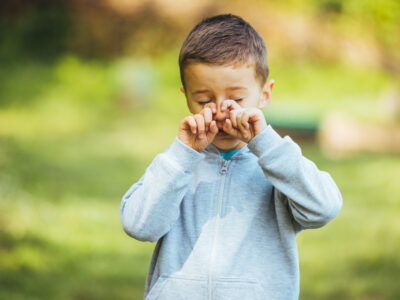Whenever you experience that tingle in your throat, nose, or sinuses, you likely think to yourself, “Oh no, did I catch a cold?” Unfortunately, those who suffer from allergic rhinitis and begin experiencing the same sensations must instead ask themselves, “Which is it this time, a cold or hay fever?”
Allergic rhinitis, more commonly known as hay fever, induces the same symptoms you are likely to experience with a cold, making it occasionally difficult to know which you are dealing with, how to treat your symptoms, and how to find relief.
Let’s look at some of the most common causes of hay fever, as well as symptoms and ways to treat it.
What Can Cause Hay Fever?
Hay fever is the result of your immune system fighting off allergy triggers that you have come into contact with. Not every allergy trigger affects patients with hay fever, and one person’s allergen or set of allergens may differ from someone else’s.
Common triggers of hay fever can include:
- Cockroach droppings
- Dust mites
- Mold spores
- Pet dander
- Pollen from trees, grasses, or ragweed

When Am I Likely to Experience Hay Fever?
Whether spring, summer, autumn, or winter, you can experience hay fever at any point in the year depending on the allergens that trigger your immune system to react. Patients with a pollen or ragweed allergy are more likely to suffer from seasonal hay fever in the warmer months, while those allergic to dust mites or pet dander can struggle with bouts of hay fever at any point.
Seasonal Hay Fever Triggers:
- Grass pollen (spring and summer)
- Ragweed pollen (autumn)
- Tree pollen (early spring)
- Outdoor fungi and mold spores (spring to autumn)
Year-Round Hay Fever Triggers:
- Pet dander
- Dust mites
- Cockroach droppings
What Are the Symptoms of Hay Fever?
People who suffer from hay fever tend to exhibit the same symptoms as a common cold.
Hay fever symptoms include:
- Congestion in the nose and sinuses
- Excessive coughing
- Excessive sneezing
- Fatigue
- Postnasal drip
- Swollen facial features, especially under the eyes
Patients with hay fever also commonly experience:
- Eye irritation (watery, itchy, swollen eyes) due to allergy-induced conjunctivitis
- Itchiness and tingling in the nose, throat, and mouth
What Is the Difference Between Hay Fever and a Cold?
While a cold and hay fever can present similarly and are both treatable, there are fundamental differences between the two. First and foremost, a cold is contagious while hay fever is not. Cold symptoms arise after a cold virus infects the body. The immune system will fight against the virus to either kill it or flush it out of the body, and the methods employed will lead to symptoms like congestion, throat irritation, sinus swelling, and other side effects.
Hay fever symptoms, on the other hand, occur after the immune system encounters an allergy trigger and overreacts. The immune system can attack the allergen(s) the same way it would a cold virus, leading to cold-like symptoms as a result.
Can I Tell the Difference Between Hay Fever and a Cold?
Even though the symptoms are similar, patients with hay fever can usually tell which is which pretty quickly after symptoms arise.
If it’s hay fever, the patient can experience:
- Congestion with mucus that is thinner and more watery than that of a cold
- Symptoms that arise instantly after allergen exposure
- Symptoms that go away once the allergen is no longer present
If it’s a cold, the patient can experience:
- Congestion with thick, cloudy mucus
- Possible body aches or fever
- Symptoms that arise roughly 1-3 days after exposure to a cold virus
- Symptoms that last roughly a week depending on how the cold is treated
How to Treat Hay Fever
Although hay fever can be hard to avoid depending on your allergy triggers, it is treatable with certain individualized treatment plans and methods.
Effect treatment can include over-the-counter or prescription:
- Nasal sprays
- Antihistamines
- Decongestants
- Corticosteroids
Patients may also benefit from:
- Allergy shots, or immunotherapy
- Allergy tablets
- Nasal irrigation routines
- Lifestyle changes*
- Home remedies*
*Lifestyle changes and home remedies can involve a number of solutions to minimize your exposure to your hay fever triggers, such as:
- Removing indoor pets
- Using HEPA filters
- Keeping windows and exterior doors closed when indoors
- Using allergy-proof covers on your bed and pillows
- Regularly vacuuming and dusting your home

If you suffer from symptoms of hay fever, speak with the allergy specialists at Langford Allergy.
Dr. Langford and our team offer thorough allergy testing and can help you understand your immune system’s reaction to allergens that trigger hay fever. Whether your symptoms are mild or severe, we can provide the treatments to ease your hay fever and help minimize the irritation that your triggers may cause. Schedule an appointment or call our office to learn more: 478-787-4728
Related articles:
How to Avoid Summer Allergies Indoors and Outside
Is My Baby Having an Allergic Reaction?
Understanding Seasonal & Perennial Allergies and Non-Allergic Rhinitis
